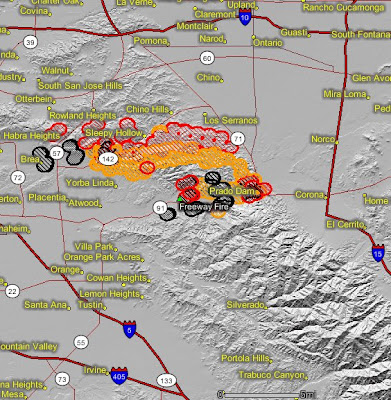The mayor of Yorba Linda took the unusual step of ordering that a prelimary report on the Freeway fire be prepared one week after the fire was out. On November 15, 187 homes were destroyed and an additional 127 were damaged during this fire which started near Corona, California.
During a city council meeting on Tuesday when the report was discussed, Orange County Fire Authority (OCFA) Chief Chip Prather said:
There was more fire than we had fire engines. We did not have enough fire engines to match the demand. That’s going to happen in a disaster like this.
Burning with single-digit humidities and winds gusting up to 40 mph, the fire that started near Corona merged with another fire near Brea. The merged fires eventually burned 30,050 acres. Almost 4,000 firefighters from 267 agencies worked on the fire.
Most of the homes that burned were ignited not by direct flame impingement or radiation from nearby vegetation, but by embers blown far ahead of that fire that were sucked into attics and eaves.
A lack of water pressure made it impossible for firefighters to protect some homes. From the Orange County Register:
OCFA water tenders were called in to shuttle water to crews. But the water pressure problems also hindered the tenders’ efforts, Prather said. Some of the depletion of water pressure was directly attributed to engines drawing thousands of gallons of water a minute from hydrants simultaneously, Prather said.
Water district officials were notified of the water-pressure problem immediately but were unable to figure out the reason for the pressure loss, the report said. It took more than three hours for water pressure to improve enough for water tenders to continue filling up, the report said.
One fire strike team leader told Prather that his crews could have saved five to six homes of the dozens of homes burned in the Hidden Hills neighborhood. But without water, the team’s five engines were forced to move to lower ground. There, they found hydrants with water and made a stand against the blaze.
Watching the water situation from its emergency operations center, it wasn’t until 5:50 p.m. Nov. 15 that water district officials asked OCFA for three fire engines to pump water at Pepper and Manzanita to increase water pressure. The engines sat on the street pumping water between two of the district’s water grids for nearly eight hours, forcing their fuel tanks to be refilled twice, Prather said.

